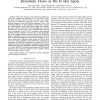Free Online Productivity Tools
i2Speak
i2Symbol
i2OCR
iTex2Img
iWeb2Print
iWeb2Shot
i2Type
iPdf2Split
iPdf2Merge
i2Bopomofo
i2Arabic
i2Style
i2Image
i2PDF
iLatex2Rtf
Sci2ools
81
Voted
GLOBECOM
2006
IEEE
2006
IEEE
Analysis of Unfairness between TCP Uplink and Downlink Flows in Wi-Fi Hot Spots
Abstract— This paper focuses on the unfairness problem between TCP uplink and downlink flows in the 802.11 Wi-Fi hot spots and shows that the service is prone to be unfair. The cause of unfairness is analyzed from two aspects: TCPinduced asymmetry and MAC-induced asymmetry. Due to the asymmetric behavior of TCP congestion control with a cumulative acknowledgment mechanism between uplink and downlink flows, the service is biased toward the uplink flow and the downlink flow tends to starve. The contention-based channel access mechanism of 802.11 MAC exacerbates this unfairness problem because it intends to provide fair access opportunity only to the sending stations. Next, the analysis of the interaction between congestion control of TCP and contention control of MAC reveals interesting and counter-intuitive results: (i) Even when a station has a sufficiently large amount of traffic to send, it does not always participate in the MAC-layer contention, its opportunity for MAC-layer...
| Added | 11 Jun 2010 |
| Updated | 11 Jun 2010 |
| Type | Conference |
| Year | 2006 |
| Where | GLOBECOM |
| Authors | Eun-Chan Park, Dong-Young Kim, Chong-Ho Choi |
Comments (0)

